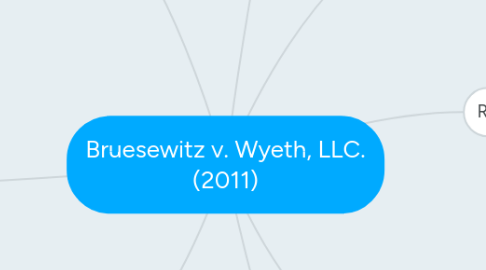
1. Impact of Decision
1.1. The interpretation of the National Childhood Vaccination Injury Act has brought rise to what is referred to as a texualist or "plain meaning" approach to the interpretation of this statue
1.2. American Home Products Corporation et al v. Ferrari et al
1.2.1. Similar to Hannah, the son of Ferrari (Plaintiff) allegadely suffered neurological damages as a result of a vaccine
1.2.2. The boys parents filed a suit against a number of vaccine manufactures claiming that they had, under Georgia state law, negligently manufactured a harmful product because it contained Mercury, a well known toxic substance
1.2.3. The trail court decided against Ferrari, citing the manufacture could not be found at fault under the NCVIA of 1986
1.2.4. On appeal, the Appeal Court ruled against the lower court, citing that the boys injuries could of been avoided by omitting of the toxic substance mercury
2. Relevance to Business
2.1. The result of this case, really proved the resilience of the protection afforded to manufactures in the vaccine industry. This fosters creativity and competition in the industry, and above all, encourages companies to operate in a fashion that is in compliance with regulatory requirements.
3. Business Practices Influenced
3.1. Regulatory Requirements Management has emerged as a vital discipline for those corporations seeking to maintain profitability through avoiding unnecessary and costly litigation
3.2. This case has exemplified the benefits of full disclosure. As a result, there has been an increase in communication across the industry, peer to peer, as well across regulatory bodies.
4. Facts
4.1. Parties
4.1.1. The Bruesewitz- the mother and father of Hannah (Plaintiff)
4.1.2. Wyeth, LLC- a subsidiary of Pfizer Inc. (Defendant)
4.2. Background
4.2.1. At 6 months old, Hannah was administered the DTP vaccine manufactured by Wyeth, LLC.
4.2.1.1. Vaccine administration was in accordance with the Center for Disease Control's schedule for childhood immunizations
4.2.2. Within 24 hours Hannah began and continued to experience seizures
4.2.2.1. Hospitalized for weeks, Hannah was later diagnosed with "residual seizure disorder" and "developmental delay"
4.2.3. The Bruesewitz's filed a claim in the US Court of Federal Claims, under the National Childhood Vaccine Injury Act (NCVIA); claim was denied
4.2.3.1. The Bruesewitz filed a suit at the state level, that was passed to the federal district court, affirmed by the US Court of Appeals, that the claim was trumped by the NCVIA; The Bruesewitz appealed to the Supreme Court
4.2.4. Hannah's disorder was removed from the list of compensable injuries a month before her parents petitioned her claim
5. Issue
5.1. Whether Wyeth, LLC. is liable for the Hannah's medical injuries?
5.2. Whether Hannah should be compensated for her medical injuries, allegedly resulting from the DTP vaccine?
6. Rule of Law
6.1. Strict Product Liability
6.1.1. Product must be unreasonably dangerous due to a flaw in manufacturing process, a design defect, or an inadequate warning
6.2. National Childhood Vaccine Injury Act of 1986
6.2.1. Provides vaccine manufacutures with tort liability protection aimed at protecting the vaccine manufacturing industry as a whole
6.2.1.1. Immunizes manufactures from liability from a vaccines unavoidable and adverse side effects, as long as the manufacture has complied with regulatory requirements
6.2.2. Incorporates a compensation program funded via a tax on each dose of the vaccine, and is governed by the United States Court of Federal Claims
7. Application
7.1. Liability of Wyeth, LLC.
7.1.1. No evidence of violations of regulatory requirements as it pertains to manufacturing processes, design defects, or inadequate warnings
7.1.1.1. As a result, does not meet the requirements for Strict Product Liability
7.2. Determination of Compensation
7.2.1. Plaintiffs claiming suffering as a result of a vaccine can petition the United States Court of Federal Claims under the NCVIA of 1986 to receive the appropriate level of compensation for their losses. Hannah's seizure disorder was removed from the list of compensable disorders
7.2.1.1. As a result, the Bruesewitz's situation is not eligible for compensation
8. Conclusion
8.1. The United States Supreme Court affirmed the lower courts decision
8.1.1. The NCVIA preempted the Bruesewitz claim against Wyeth LLC for compensation
